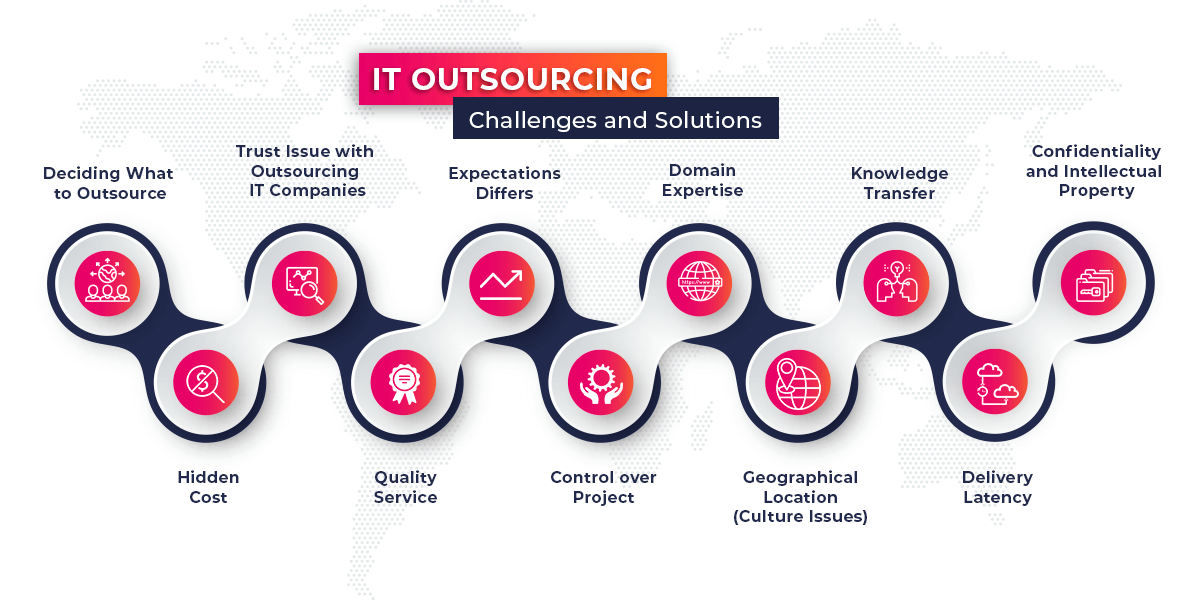Outsourcing is an increasing trend, and now, it has become a widespread practice for businesses to contract out projects or complex tasks to third-party providers -outside the company. While there are many benefits of outsourcing, achieving outsourcing success in these areas is not an easy task. There are plenty of things involved in receiving positive results when it comes to outsourcing projects in other countries. With solid preparation and planning can help you mitigate the risks of outsourcing, but understanding the potential pitfalls can help you nothing more than this.
In this article, we shall be discussing the rising outsourcing challenges and also help you with practical solutions to mitigate them quickly. So, before we get into the issue, let’s talk some of the essential factors, including its market value.
85.6 bn USD is the Global market size of outsourced services in 2018 – Statista Report
64% of IT leaders worldwide prefer to outsource software application development. – Statista 2017 Report
Growing IT Functions Outsourcing Lie Beneath Immense Challenges…
IT outsourcing trend brings opportunity for IT leaders who look for increasing efficiency, utilizing better technologies, reducing cost, increase resource scalability and business process standardization. However, achieving outsourcing success, one needs to tackle outsourcing vulnerabilities. We shall be discussing the challenges of IT functions outsourcing and how to overcome them.
Also Check our Article : “Why Outsourcing is Important To Increase Your Profit Margin?“
IT Outsourcing Challenges and Solutions
IT functions outsourcing risk factor varies depending on the source of IT and the model is being outsourced. For example, when you have routine IT projects such as documentation, data entry, disaster recovery, data center operations and others, then you are supposed to face less risk as these are the things which are well defined and routine procedures. Whereas the IT functions like the development of business apps, managing interfaces, data mining and other mobile and web app development outsourcing, the risk is higher, and you might not achieve the desired outcomes – if you are not aware of the challenges. 
Deciding What to Outsource
The initial challenge of IT outsourcing is to determine what to outsource -which functions or activities to be outsourced and which to be developed in-house. Whether you want to outsource the whole projects or just specific functions such as architecture, design, or others, needs serious attention. Solutions Mitigating this challenge, you need to decide what expertise you have and what you need to outsource for the particular projects. It’s no wise step to outsource the entire projects as it will create issues further (post-deployment). Therefore, segregate between the skill you have in-house and what you can outsource. Keep the critical part for the in-house development team and outsource the less important one. However, if you have trusted outsource partner, then think about what skills they have to provide you. If they have something exceptional talent which can make the project more fruitful than you do, then you can get the project and proportion of the project, irrespective to what you are outsourcing, developed by the outsourcing partner.
Trust Issue with Outsourcing IT Companies
Trust is the next big issue lying before you. Trusting someone located hundreds or even thousands of miles away from your company. Understanding the degree of trust can be analyzed based on the points an outsourcing company scores. Solutions to Mitigate Trust Issue You need to prepare some points that you need to ask the outsourcing companies. Here are some of the suggestions which might help you get some of the fundamental ideas. You can also include some of your customized questions based on the tips given here. Let’s take a look here;
- Whether the company is new or established
- For how long the company is serving in the industry
- How many employees are working with the company
- How experienced the developers and designers are
- The average project size it undertakes
- Go through the projects’ details and the clients
- How attractive and interactive the company’s website is
- How active the company is on Social Media Channels
- Go through the case study if any
- Find if the company has received any clients’ feedback
Expectations Differs
Generally, when you find a new outsourcing partner, the first hurdles come forward is neither your partner nor you are on the same line -you both likely to have different expectations. Lack of awareness regarding each other -precisely what you demand and how the outsourcing company executes things. Mixed expectations are common in this case, but the compromising with the priority differences such as culture and common will worsen the situation. Solutions Minimizing the expectations gulf is essential here. It would be best if you improved communication by initiating frequent meetings, adopting shared documentations and much more. Setting up a project milestone is yet another way to mitigating the differences. However, if the outsourcing partner is not working within the physical proximity, utilizing the online collaboration tools such as video conferencing, emails, etc. can work wonder. However, language and culture differences should not become the reason for disputes.
Domain Expertise
That’s a huge challenge, especially when you are working with a remote vendor. The outsourcing partner’s professional skill and development need to be appropriately analyzed. You must go through the background of the vendor such as expertise, degrees and other relevant things. There are instances when you fall trapped within the wrong vendor, and as a result, you get messed up with your project. Solutions Better take precaution at the early stage and find out selected vendor having good years of experience and expertise in the chosen technologies. Take interviews of developers and designers; ask about their way of doing things; also look at some of the projects which were developed, implemented and accomplished by the outsourcing company. You can also go through the quality and quantity of the projects.
Knowledge Transfer
Tackling knowledge transfer is one of the most crucial tasks ahead. Generally, there are two ways of knowledge transfer: the first includes sharing information and data and knowledge from the outsourcer so that outsourcing company would provide what you (outsourcer) want. The second consists of “know-how” and fluency in the products. For example, the customer will have the code, but they don’t “know-how/experience, and it can achieve through two-way knowledge transfer. Solutions
- Find outsourcing company having state-of-the-art software tools
- Ensure that the outsourcer is capable enough to provide accurate information
- Ensure there is innovative roadmap created as part of the knowledge transfer process
- Make sure to have regular communication
- There has to proper management tool so you can get every single detail of the work progress
Confidentiality and Intellectual Property
When you outsource, you are handing over some of the most important things to another company. Your sensitive information, such as data, employees, and their details may be misused. There are ways which can be implemented at the time of deal (project development deal).
76% of respondents indicated that regulations around data privacy and protection are affecting their disruptive outsourcing decisions – Deloitte 2018 outsourcing report
Solutions
- You must find a company ready to sign NDA (Non-Disclosure Agreement)
- That has to be decided at the initial state or right before you hand over the project
- Get the signed agreement copy with you
You can have your privacy policy, which should include necessary clauses which entirely safeguards your rights.
Right companies never indulge in such kind of activities, but you cannot go on trusting to them at first interactions. You need to contact as many companies as you can, find their policies, understand their way of doing jobs, how they protect your data and keep your project confidential.
Hidden Cost
This is something which most of the outsourcers don’t know at the initial stage. It comes into light in the mid of the project development. Such is the situation where you feel helpless. You need to mitigate this right before you hand over the project to your outsourcing partner. Solutions
- Ask your vendor if there is any hidden cost
- Know your needs considering the future factors
- The contract should include all additional costs that may occur
- Finalize hourly cost/ overtime cost/ software/hardware cost, etc.
- Take advice from a third-party law firm, having expertise in such a task
This is not the case with every company, though you need to go through every single detail, analysis, inquiries and whatever you find possible to get the right. More than that, when you engage with companies, vendor or your IT specialist, you are not going to handover the project straightforwardly. During the interaction, you will come to know plenty of things and ideas to get things in the right direction. Take interviews, ask for demos, consultations and then decide on your perception. Never be dependent on a single vendor, consult as many vendors as you can, take their quotes, understand their policies, and you will come up with a precise idea, for sure.
Also Check our Article : “Top 8 Hidden Cost of App Development“
Quality Service
Receiving the better service is the reason we outsource, right? But, it’s a challenge too. Even after going through a detailed analysis of the company and its employee, there are chances you may not get the desired results. There are companies which show great years of experience and expertise on their website, but in reality, they don’t. In such a case, finding the right IT specialist become absolutely tough. Solutions
- Ensure the outsourcing partner is capable enough in utilizing useful tools and frameworks along with their technological skills
- Know the tools and technologies your vendor employs to develop the application
- Share your expectations
- Talk to past clients who have worked with the vendor company as they will tell you the facts
Control over Project
Outsourcing project means letting someone handle the complete or part of the project. That means you entirely or partially lose control from the project. Losing control over the project may not affect if the project you are outsourcing is not cored to your business. Otherwise, you are making a wrong decision, if something goes wrong in the future. It will cost you time and money both. Solutions Establish a smooth and regular communication between your vendors. Take regular updates about projects; what is being implemented; how it is being implemented and what will be the impact of it. At the same time, you need to make sure that your outsource partner or vendor uses a perfect project management tool such as requirement-tracking software which can help you add/change in the project, even if work is in progress by the outsourcing partner. Ensure you get daily reporting by the project manager, it can be even weekly or as the time decided -based on the complexity of the project. In case, you want to have a constant eye on the very activity and event occurring with the project or want the feel the pulse, you can utilize dedicated development team outsourcing model, but that will good if you have a long-term project. It will enable you to have direct control over every employee working on the project.
Geographical Location (Culture Issues)
When you are outsourcing projects to a vendor in a different time zone, you may face some of the possible issues. Different time zone will have different working hours which invite miscommunication or lack of coherence. The cultural difference would be yet another which might hamper work as the work ethics may differ to a certain extent. Solutions
- You can need to play a reactive role here -without waiting for the outsource partner to initiate about how to enhance such issue. Here are some of the important things you need to consider
- Communicate to your vendor in advance about your concerns. Discuss how both of you are going to have smooth communications in future
- Discuss everything related to cultural differences and how you can mitigate it and establish mutual understanding
- Discuss time -both of you can compromise and decide a time when both of you are available to talk
Delivery Latency
Once you have set your project objective with your outsource partner, the next step is to keep up with deliverables as both of you are bound with time. If you don’t your project in your time, you can deliver it to your customers on the same promise. At the same time, the delays or change in orders may increase development hours, and it will increase the cost as well. Solutions It has a simple solution, and that is to be transparent and realistic about expectations for delivery. It should not be only regarding the deadline but also for the meeting the quality project. Regular communication with clients, taking updates of work progress will let your outsource feel the urgency of the project.
Also Check our Article : “The Ultimate Guide to Hire Remote Developers“
Laws and Government Regulation Risks
That’s very important, and it is something that most the companies, sometimes do ignore just to save some money. Every country has its own IT and outsourcing law which protects the interest of both outsourcing companies as well as the outsource partner. If you are not following the law of the land, you will not have any support from the local government if in case something goes wrong. Solutions Let me tell one thing when you outsource project to south Asian countries like India, you already get the cheapest development cost. So, going through the legal process will not cost you more while you will be protected by law and the local government will support you if in case anything goes beyond your contract or something unprecedented happens.
Here is an Infographics of IT Outsourcing 2020, you should go through.

78% of business owners across the globe are satisfied with their outsourcing partner. – Deloitte 2016 Global Outsourcing Survey
Conclusion In short, outsourcing brings plenty of benefits, but nothing comes out capable unless you are aware of how to make it successful. Planning and choosing the right outsourcing partner will be necessary, but know the risk of outsourcing will help correctly tackle the situation which might occur in the future. There are many other things you can find by going through online resources, though I have tried to assert every challenge which most probably will occur here. When you go through this, you will gain confidence and find the right outsourcing partner for the long run.




